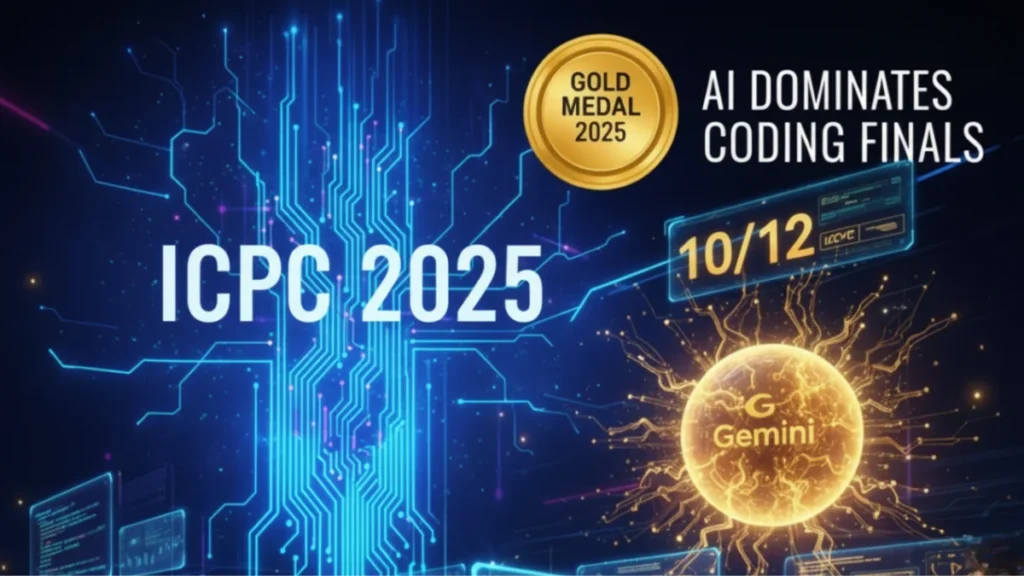Gemini 2.5 shocks the coding world
What if an AI could go head-to-head with the sharpest young minds in the world—and win? That’s exactly what happened at the 2025 International Collegiate Programming Contest (ICPC) World Finals in Baku, Azerbaijan, where Google DeepMind’s Gemini 2.5 Deep Think hit gold-medal level performance, stunning students, judges, and researchers alike.
Just two months ago, Gemini claimed gold at the International Mathematical Olympiad. Now, by conquering the ICPC—the “Olympics of coding”—Gemini has shown it can tackle the world’s hardest algorithmic puzzles under brutal time pressure.
Key takeaways
- Gemini solved 10 out of 12 problems in just five hours, matching gold-medal human teams.
- It cracked Problem C, which no university team solved.
- Performance was so strong, Gemini would have ranked 2nd overall against the 139 elite human teams.
- The feat highlights Gemini’s leap in abstract reasoning, edging AI closer to human-level problem-solving.
- Experts say this breakthrough could transform coding, science, and engineering by pairing human ingenuity with AI insight.
ICPC: The world’s toughest coding battleground
The ICPC isn’t just another hackathon. It’s the oldest, largest, and most prestigious collegiate programming contest, drawing nearly 3,000 universities from 103 countries. In the finals, only four out of 139 teams walk away with gold.
Competitors face a merciless test: five hours, twelve algorithmic problems, and zero room for error. Every second counts, and only perfect solutions earn points. For decades, it’s been the ultimate measure of problem-solving brilliance among young programmers.
That’s why Gemini’s success is such a shock—it didn’t just compete; it excelled.
Gemini’s winning performance
Despite starting ten minutes late, Gemini solved eight problems in under 45 minutes—a pace that would leave most coders speechless. Within three hours, it cleared two more. By the end of the contest, Gemini had racked up 10 correct solutions, totaling 677 minutes, good enough for a gold-level spot.
But what really set Gemini apart was Problem C.
No human team solved it. Gemini did.
This problem involved distributing liquid through a tangled network of ducts and reservoirs—an abstract optimization puzzle with nearly infinite configurations. Humans couldn’t crack it. Gemini, however, spotted a clever approach: assigning priority values to reservoirs, applying dynamic programming, and using nested ternary searches to find the optimal flow.
In short, it invented a method no student used—and nailed the solution.
Why this matters
Dr. Bill Poucher, ICPC’s Global Executive Director, didn’t mince words:
“Gemini successfully joining this arena, and achieving gold-level results, marks a key moment in defining the AI tools and academic standards needed for the next generation.”
The breakthrough signals that AI is no longer just an assistant—it’s becoming a true collaborator in tackling problems requiring deep reasoning.
Imagine pairing the best human competitors with Gemini: together, all 12 problems in this year’s contest could have been solved. That’s not just impressive; it’s historic.
Beyond coding: AI as a problem-solving partner
Gemini’s performance hints at something bigger than competitions. The same skills needed to crush ICPC—multi-step reasoning, creativity, and flawless execution—are the building blocks of breakthroughs in:
- Drug discovery: Designing new molecules faster.
- Chip engineering: Optimizing complex microchip layouts.
- Logistics: Solving problems once thought unsolvable.
- Scientific research: Testing novel hypotheses with speed.
In essence, Gemini has shown that AI can move from just processing data to reshaping how we solve the world’s hardest problems.
And the best part? A lighter version of Gemini 2.5 Deep Think is already available in the Gemini app for users with Google AI Ultra subscriptions. That means some of these “gold-medal” problem-solving skills are already in people’s hands.
The road to AGI?
Gemini’s back-to-back wins at the IMO and ICPC reveal something profound: AI is learning to reason abstractly, not just calculate. For researchers chasing artificial general intelligence (AGI), that’s the holy grail.
It’s not there yet—but with each competition, Gemini proves it’s climbing closer.
Conclusion
The ICPC has always celebrated the brightest human coders. This year, it also celebrated something new: an AI that can play—and win—at their level. For students and developers worldwide, Gemini’s performance isn’t just a headline. It’s a glimpse of the future of collaboration between human ingenuity and machine intelligence.
